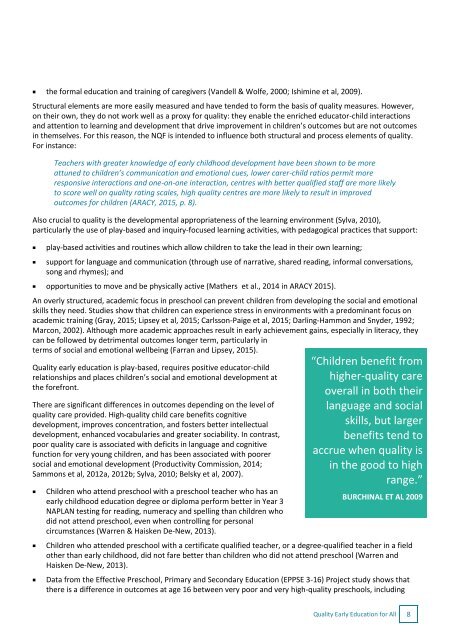Quality Early Education for All
Quality-Early-Education-for-All-FINAL
Quality-Early-Education-for-All-FINAL
Create successful ePaper yourself
Turn your PDF publications into a flip-book with our unique Google optimized e-Paper software.
• the <strong>for</strong>mal education and training of caregivers (Vandell & Wolfe, 2000; Ishimine et al, 2009).<br />
Structural elements are more easily measured and have tended to <strong>for</strong>m the basis of quality measures. However,<br />
on their own, they do not work well as a proxy <strong>for</strong> quality: they enable the enriched educator-child interactions<br />
and attention to learning and development that drive improvement in children’s outcomes but are not outcomes<br />
in themselves. For this reason, the NQF is intended to influence both structural and process elements of quality.<br />
For instance:<br />
Teachers with greater knowledge of early childhood development have been shown to be more<br />
attuned to children’s communication and emotional cues, lower carer-child ratios permit more<br />
responsive interactions and one-on-one interaction, centres with better qualified staff are more likely<br />
to score well on quality rating scales, high quality centres are more likely to result in improved<br />
outcomes <strong>for</strong> children (ARACY, 2015, p. 8).<br />
Also crucial to quality is the developmental appropriateness of the learning environment (Sylva, 2010),<br />
particularly the use of play-based and inquiry-focused learning activities, with pedagogical practices that support:<br />
• play-based activities and routines which allow children to take the lead in their own learning;<br />
• support <strong>for</strong> language and communication (through use of narrative, shared reading, in<strong>for</strong>mal conversations,<br />
song and rhymes); and<br />
• opportunities to move and be physically active (Mathers et al., 2014 in ARACY 2015).<br />
An overly structured, academic focus in preschool can prevent children from developing the social and emotional<br />
skills they need. Studies show that children can experience stress in environments with a predominant focus on<br />
academic training (Gray, 2015; Lipsey et al, 2015; Carlsson-Paige et al, 2015; Darling-Hammon and Snyder, 1992;<br />
Marcon, 2002). Although more academic approaches result in early achievement gains, especially in literacy, they<br />
can be followed by detrimental outcomes longer term, particularly in<br />
terms of social and emotional wellbeing (Farran and Lipsey, 2015).<br />
<strong>Quality</strong> early education is play-based, requires positive educator-child<br />
relationships and places children’s social and emotional development at<br />
the <strong>for</strong>efront.<br />
There are significant differences in outcomes depending on the level of<br />
quality care provided. High-quality child care benefits cognitive<br />
development, improves concentration, and fosters better intellectual<br />
development, enhanced vocabularies and greater sociability. In contrast,<br />
poor quality care is associated with deficits in language and cognitive<br />
function <strong>for</strong> very young children, and has been associated with poorer<br />
social and emotional development (Productivity Commission, 2014;<br />
Sammons et al, 2012a, 2012b; Sylva, 2010; Belsky et al, 2007).<br />
• Children who attend preschool with a preschool teacher who has an<br />
early childhood education degree or diploma per<strong>for</strong>m better in Year 3<br />
NAPLAN testing <strong>for</strong> reading, numeracy and spelling than children who<br />
did not attend preschool, even when controlling <strong>for</strong> personal<br />
circumstances (Warren & Haisken De-New, 2013).<br />
“Children benefit from<br />
higher-quality care<br />
overall in both their<br />
language and social<br />
skills, but larger<br />
benefits tend to<br />
accrue when quality is<br />
in the good to high<br />
range.”<br />
BURCHINAL ET AL 2009<br />
• Children who attended preschool with a certificate qualified teacher, or a degree-qualified teacher in a field<br />
other than early childhood, did not fare better than children who did not attend preschool (Warren and<br />
Haisken De-New, 2013).<br />
• Data from the Effective Preschool, Primary and Secondary <strong>Education</strong> (EPPSE 3-16) Project study shows that<br />
there is a difference in outcomes at age 16 between very poor and very high-quality preschools, including<br />
<strong>Quality</strong> <strong>Early</strong> <strong>Education</strong> <strong>for</strong> <strong>All</strong> 8


